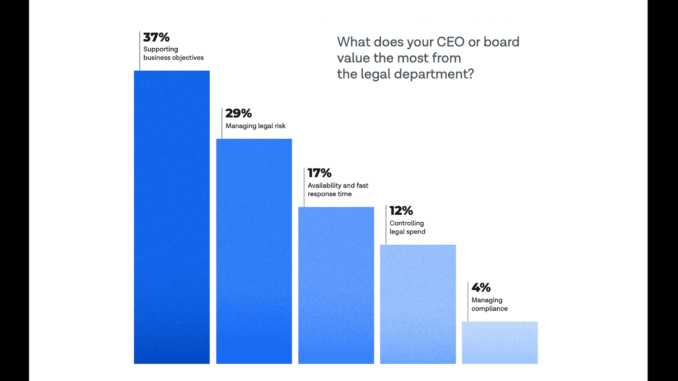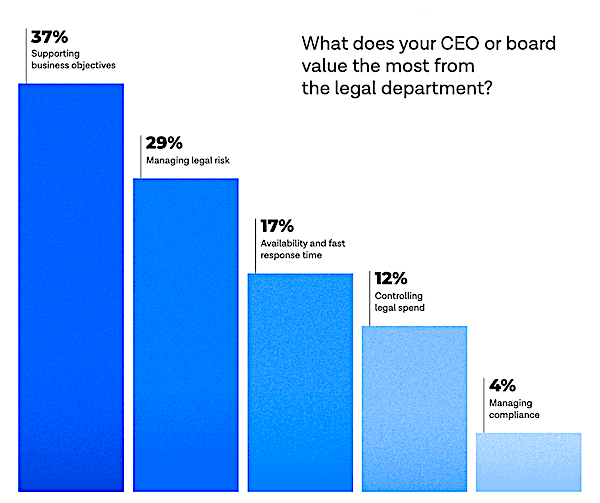
A new survey of 100 GCs and law department heads by BRYTER has found that only 12% believe ‘controlling legal spend’ is what the CEO or company’s board value the most from the legal department. Meanwhile ‘supporting business objectives’ came top at 37%, (see table below).
This tends to undermine a long-standing idea that inhouse lawyers are under huge pressure to cut costs – which it has to be said never really seemed to fit with what we see daily in the market.

Given the surge in legal spending over the last two years it has always seemed a bit amiss to think that companies were really cutting back on legal fees, or that GCs were getting roasted by CEOs for spending too much on business-critical legal matters.
If legal spending overall has been such an issue, then how come so many law firms have seen surging revenues and the acceptance of higher charge out rates by their clients? Those are not indicators of an industry pushing back hard on providers.
Moreover, it’s always seemed to this site that when it comes to survival or getting the legal underpinning right for a major transaction, a risky financial move, or a strategic shift in direction, then corporates don’t fret about the bills. They tend instead to pair off with legal advisers that are matched to their position in the market and then spend as they see fit.
I.e. Mid-size companies pair off with mid-size law firms – but pay what they ask, likewise global giants pair off with very large law firms and also pay what they ask for.
Where the pressure is seems to be is on high volume, high frequency work where the risks are lower, and where such work is highly integrated into other parts of the business, e.g. the sales team, such as reviewing day to day contracts for the retail of goods and services. And it’s here where we see naturally enough the relevance of CLM technology and a lot of attention from the legal ops world as well.
It’s also interesting to note that compliance is really not viewed – so the GCs believe – as a big deal by CEOs, at least in terms of how they value the input of their multi-million pound internal legal teams. ‘Managing compliance’ scored a minuscule 4% in terms of how the lawyers thought the CEO and board valued their support.
So, what does this mean? It shows that although we can get bogged down with the idea that the corporate leadership are fretting about legal spend, they aren’t really that much for certain parts of the spend – i.e. not when legal can support key strategic decisions. And that makes total sense.
Businesses employ legal teams because 1) it’s a way of reducing risk and allowing them to safely do what they want to do, and 2) to defend them against threats, and 3) er…, that’s mostly it really. For a business, lawyers are risk reduction engines, whether that’s for the more day to day work, or for the big ticket, bet-the-company moves. But either way, the people who own and run the business want their expenditure on risk reduction to support the business’s main objectives – and they’d be nuts to be spending that money otherwise.
And this connects back to yesterday’s article about a human-centric approach to legal tech, which is all about being empathetic to the real needs of lawyers, or in this case, the very real needs of a CEO who wants to drive growth but is worried they may get into a legal quagmire with, for example a new type of product, and so wants – above all else – the legal team to reassure them that they can do what they want to do, and then make sure that the legal work enables them to do that safely.
Does this mean that legal tech which can’t help on such high value matters is not important to companies? Nope. It’s still essential. As the survey conducted with the Alternative In-House Technology Summit shows, the high frequency and process work also weighs heavily on the mind of the GCs, even if it’s not worrying the CEO that much other than they’d like you to reduce the costs of handling that stream of work.
The process end – which does not keep the CEO awake at night, although it may mildly perturb them – is where most of the legal tech and ALSP / managed legal services / legal ops consulting action is focused. From no-code tools that can help with improving digital workflows, to contract management and CLM systems, to external providers taking on the legwork of reviewing contracts, to NLP-driven contract analysis providers (and with much of this provided via CLM and contract management tools as well), and much more, there is a mass of activity in this part of the GC’s world.
So, what we have here is a two-part system, where the high value work is not really cost constrained and is where the CEO is really focused, and the less high risk work that really does have an economic border to it and that really does cause capacity issues for the GC, and where legal tech and better staffing and processes can significantly help.
Hence when it comes to the question: do CEOs care about legal spend, the answer is: it depends….although, the bit they may want to see cut down in terms of spending is not the bit they worry about the most.
You can find the full BRYTER report here.